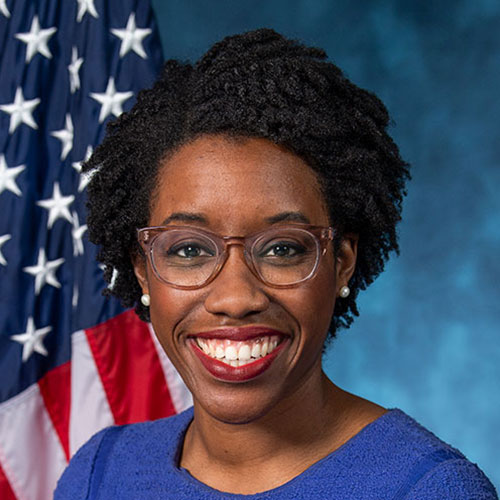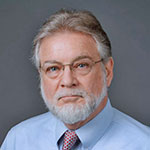
New APHA Book Warns Social Systems Are Driving Deepening Health Inequities
Penn LDI’s Antonia Villarruel and 10 Other Authors Map Social Determinants Across Multiple Racial and Ethnic Groups
News | Video
Joining Penn Nursing Dean Antonia Villarruel in a wide-ranging discussion of women’s health issues at Penn LDI’s annual Charles C. Leighton, MD Memorial Lecture, Congresswoman Lauren Underwood, D-Ill., spoke candidly on Roe v. Wade, maternal mortality, racial disparities in Congress, voter suppression, and the need for academic researchers to engage more extensively in the policymaking process.
Underwood, MSN, MPH, was elected to the U.S. House of Representatives from Illinois’s 14th district in 2018 as the youngest Black woman to serve in Congress. Reelected in 2020, she is the Co-Founder of the House Black Maternal Health Caucus and serves on the House Democratic Steering and Policy Committee. Prior to joining Congress, she was an Obama Administration senior advisor at the Department of Health and Human Services focused on implementation of the Affordable Care Act.
Founded in 2019, her Black Maternal Health Caucus is famed for its proposed 2021 “Momnibus” legislation that would comprehensively address every dimension of the U.S. maternal health crisis that kills two to three times more Black women than white women each year.
On another women’s health issue, Dean Villarruel cited Underwood’s recent remarks on the floor of the House about the leak of a Supreme Court preliminary draft decision overturning Roe v. Wade. She asked the Congresswoman to recap her concerns.

“What we’re seeing in that leaked draft from Justice Alito,” said Underwood, “is the first time a constitutional right would be taken away in this country.” She went on to emphasize that the overturning Roe v. Wade has wide-ranging legal implications, including for precedents like Loving v. Virginia that struck down laws banning interracial marriage; Obergefell v. Hodges, that ruled same-sex marriage was a right protected by the constitution; and even Brown v. Board of Education, that ruled racial segregation of children in public schools was unconstitutional.
“There are states seeking to prosecute and put in jail the health care providers involved in not only offering abortion care, but providing counseling to their patients who are seeking accurate health care information to empower their own decision making,” Underwood continued.
“The stakes could not be higher,” she said. “We as voters, as clinicians, as researchers, as leaders, have agency. We can be voices of authority on this issue, which means we need to be comfortable speaking to the media about it. We can be speaking clearly to the communities that we serve about the options and be willing — within your scope of practice and the state laws that apply to you — to help people get the health care they need by directing them to safe resources.”
“I see it all connected, like our maternal health work,” said Underwood. “If you’re going to be a champion with us to save moms’ lives and end maternal mortality, it’s not a stretch to be a champion with us to preserve our access to reproductive health care.”
The Congresswoman emphasized that health care policy is inextricably wrapped up in politics, and everyone needs to pay more attention to electing people who support their values in health care.

“Most people assume that the Congress works on those issues that are most important, most consequential, for the American people,” Underwood said. “That is not true. Congress works on the issues that the members raise. The members are who set the agenda. We write the bills. We call the bills to the floor. We set the floor schedule. What gets a vote? What doesn’t?”
“Who we elect to write these laws matters at all levels of government. It’s important to vote because your state level officials have a lot of power in this context,” she continued. “And so, there’s an opportunity for all of us to make our voices heard at the ballot box, to elect leaders that protect our right to bodily autonomy, our reproductive freedom and our decision making.”
“We need a Congress that looks like the American people,” Underwood continued. “When we think about our first days as a new nation, who were the folks legally able to serve in the Congress? Wealthy white, male, Christian landowners. And that legacy has been with us over the centuries, limiting other voices and lived experiences that can spotlight problems to be solved.”
“Voter suppression is a real thing,” Underwood said. “It happens everywhere and it’s not just against Black people. It happens to all of us, and we have to be vigilant and be clear-eyed about it and seek a resolution as quickly as possible. “
Villarruel asked how, beyond just the power of their vote, academics could best make their voices heard as clinicians and researchers to more effectively engage in policy.
“You don’t have to quit your job and spend two years running for Congress to be impactful, although we would welcome you doing that because we need more health care folks serving in the Congress,” said Underwood. “But you can serve from home right where you are right now.”
“Everybody now knows they have a health department,” said Underwood. “They know who runs their health department. They may have strong feelings about that person’s leadership. Well, guess what? That health department has an oversight board. Maybe it’s a county board, maybe it’s a board of health. Maybe that board is appointed. Maybe you run for election. Maybe in that election you’re a partisan candidate, but perhaps you can run in a nonpartisan way. My point is all of us need to be serving on the oversight boards of our local health departments.”
“There are also many, many opportunities for federal appointments — advisory boards to full-time jobs that pay,” she continued. “And there are opportunities for you to seek those appointments and you can be in touch with your member of Congress or your senator to get pointed in the right direction.”
Responding to incoming questions from the audience, Villarruel asked Underwood how much a role science actually plays in policymaking on the Hill.
“My staff and I read journal articles,” said Underwood. “We are always looking for evidence and suggestions for bills to draft and policies to adopt in order to save lives, save money, and scale up interventions that work. We have found a number of great ideas from these articles. For instance, a JAMA article came out in the summer of 2020 describing the interaction of extreme heat and air pollution on negative maternal and infant outcomes. That went into our Momnibus bill. We are paying attention and we want to hear from researchers.”
“However,” she noted, “I urge you to write up your findings in a way that a non-researcher can understand and include recommendations to make it actionable. It’s really important to make it clear in the discussion section what you think we should do.”
Underwood also encouraged academics not to shy away from highly charged topics.
“Just because something might be momentarily controversial doesn’t mean it’s wrong,” Underwood said. “I served with a wise man and a hero in American history — John Lewis — and he always encouraged us to make ‘good trouble’.”
“I think that kind of mindset is something we need to really embrace in this field where we’re seeing some public servants with incredible expertise and a legacy of addressing HIV and COVID, like Dr. Anthony Fauci, just get beat up in an outrageous way,” said Underwood. “I worry that’s a deterrent that keeps other people from stepping forward. I think the lesson should be that everyone in the country knows who Dr. Fauci is and, even if they have a strong opinion about him, they are hearing him. What an advancement that is for our country and the scientific community. Let’s be energized about it and lean into the opportunities we have to communicate with the American people.”


Penn LDI’s Antonia Villarruel and 10 Other Authors Map Social Determinants Across Multiple Racial and Ethnic Groups

A New Study of a Sample of Facilities Found Half Without Any Behavioral Health Staff

Physicians Were Paid About 10% Less for Visits Involving Black and Hispanic Patients, With Pediatric Gaps Reaching 15%, According to a First-of-Its-Kind LDI Analysis

New Study From LDI and MD Anderson Finds That Black and Low-Income, Dually Eligible Medicare Patients Are Among the Most Neglected in Cancer Care

Equitably Improving Care for Hospitalized Kids Who Experience Cardiac Arrest Requires Hospital-Level Changes, LDI Fellows Say

Billing Codes That Flag Food, Job, or Housing Insecurity in Medical Records are Underused for the Sickest Medicare Patients